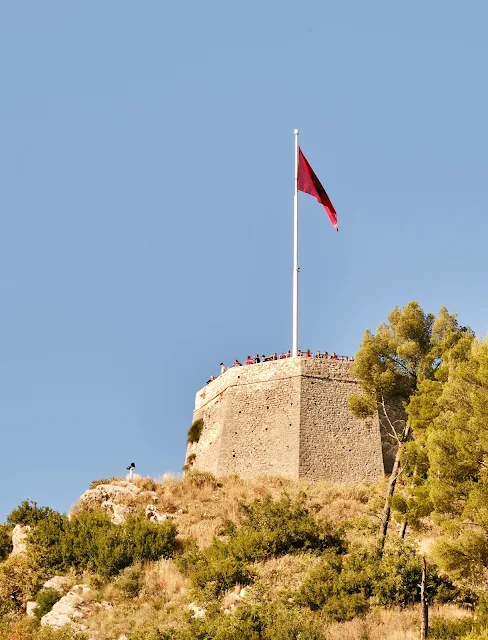Albania country details.
Albania is a country located in Southeastern Europe on the Balkan Peninsula. It is bordered by Montenegro to the northwest, Kosovo to the northeast, North Macedonia to the east, Greece to the south and the Adriatic Sea and Ionian Sea to the west.
Here are some details about Albania:
- Population: Albania has a population of approximately 2.9 million people.
- Capital city: The capital city of Albania is Tirana.
- Language: The official language of Albania is Albanian. English and Italian are also widely spoken.
- Currency: The currency used in Albania is the Albanian lek (ALL).
- Government: Albania is a parliamentary representative democratic republic.
- Religion: The majority of Albanians are Muslim (58%), followed by Albanian Orthodox (18%) and Roman Catholic (10%).
- Economy: Albania is considered a developing country and has a mixed economy. Agriculture, tourism, and energy are important sectors in the Albanian economy.
- Natural resources: Albania has significant natural resources, including oil, natural gas, coal, bauxite, copper, iron ore, and gold.
- Landmarks: Albania is known for its beautiful beaches, historic landmarks, and natural beauty. Some popular tourist destinations include the Albanian Alps, the Blue Eye (a natural spring), and the ancient city of Butrint.
- Geography: Albania covers an area of 28,748 square kilometers (11,100 square miles) and is mostly mountainous with coastal plains in the west. Its highest peak is Mount Korab, which stands at 2,764 meters (9,068 feet). Albania also has several rivers, including the Drin, Vjosa, and Mat.
- Climate: Albania has a Mediterranean climate with hot, dry summers and cool, wet winters. The coastal regions are generally milder, while the inland regions are cooler and more continental.
- History: Albania has a long and complex history, with influences from the Illyrians, Greeks, Romans, Byzantines, Ottomans, and others. Albania declared independence from the Ottoman Empire in 1912 and became a republic in 1924. During World War II, Albania was occupied by Italy and later by Germany. After the war, Albania became a socialist state under Enver Hoxha, who ruled from 1944 until his death in 1985. Albania transitioned to a multiparty democracy in the early 1990s.
- Culture: Albanian culture is a blend of various influences, including Illyrian, Greek, Roman, Ottoman, and modern European. Albanians are known for their hospitality, cuisine, music, and traditional clothing. Popular dishes include burek (a savory pastry), tavë kosi (baked lamb with yogurt), and byrek me qeep (spinach and cheese pie). Albanian music features a variety of styles, including traditional folk music, pop, and hip-hop. The Albanian language is also known for its unique alphabet, which has 36 letters.
- Education: Education is compulsory for children between the ages of 6 and 16 in Albania. The country has a literacy rate of 98.7%, one of the highest in the region. There are several universities in Albania, including the University of Tirana, which is the largest and oldest university in the country.
- Sports: Football (soccer) is the most popular sport in Albania, with the national team known as the "Red and Blacks." Other popular sports in Albania include basketball, volleyball, and handball. Albania has also hosted several international sporting events, including the 2019 European Weightlifting Championships.
- Transportation: Albania has a limited but improving transportation system, with a network of highways, railways, and airports. Tirana International Airport is the main airport in Albania, with connections to several European cities. Public transportation in Albania includes buses, minibusses, and taxis.
- Demographics: Albania has a relatively young population, with a median age of 32 years. The majority of the population (83%) is Albanian, while minorities include Greeks, Aromanians, Roma, and others. The official religion is Islam, but there is also a significant Christian minority.
- Health: Albania has a universal healthcare system, which provides free medical care to all citizens. However, the system is often criticized for its quality and accessibility. Life expectancy in Albania is 78 years, and the infant mortality rate is 12 per 1,000 live births.
- Environment: Albania is known for its natural beauty, but the country also faces environmental challenges. Deforestation, air and water pollution, and waste management are among the major environmental concerns. Albania has made efforts to protect its natural resources and has established several national parks and protected areas.
- Cuisine: Albanian cuisine is a blend of Mediterranean and Balkan influences, with a focus on fresh and local ingredients. Popular dishes include fërgesë (a dish made with peppers, tomatoes, and cheese), qofte (meatballs), and fasule (bean stew). Albanians also produce a variety of cheeses, including feta and gjizë (a soft cheese).
- Holidays: Albanians celebrate several national holidays throughout the year, including Independence Day (November 28), Liberation Day (November 29), and the Feast of Sacrifice (Eid al-Adha). Other holidays include Orthodox Easter, Catholic Easter, and Christmas.
- Famous Albanians: Albania has produced several notable figures in various fields, including Mother Teresa (a Catholic nun and humanitarian), Ismail Kadare (a novelist and poet), and Rita Ora (a singer and actress). Albanian-American basketball player, Erjon Kastrati, is also known for his successful career in the NBA.
- Military: Albania has a small military force, consisting of approximately 14,000 personnel. The country is a member of NATO and has participated in several international peacekeeping missions.
- Technology: Albania has a growing technology sector, with several startups and tech companies based in the country. The government has also invested in improving internet access and digital infrastructure.




















কোন মন্তব্য নেই
একটি মন্তব্য পোস্ট করুন